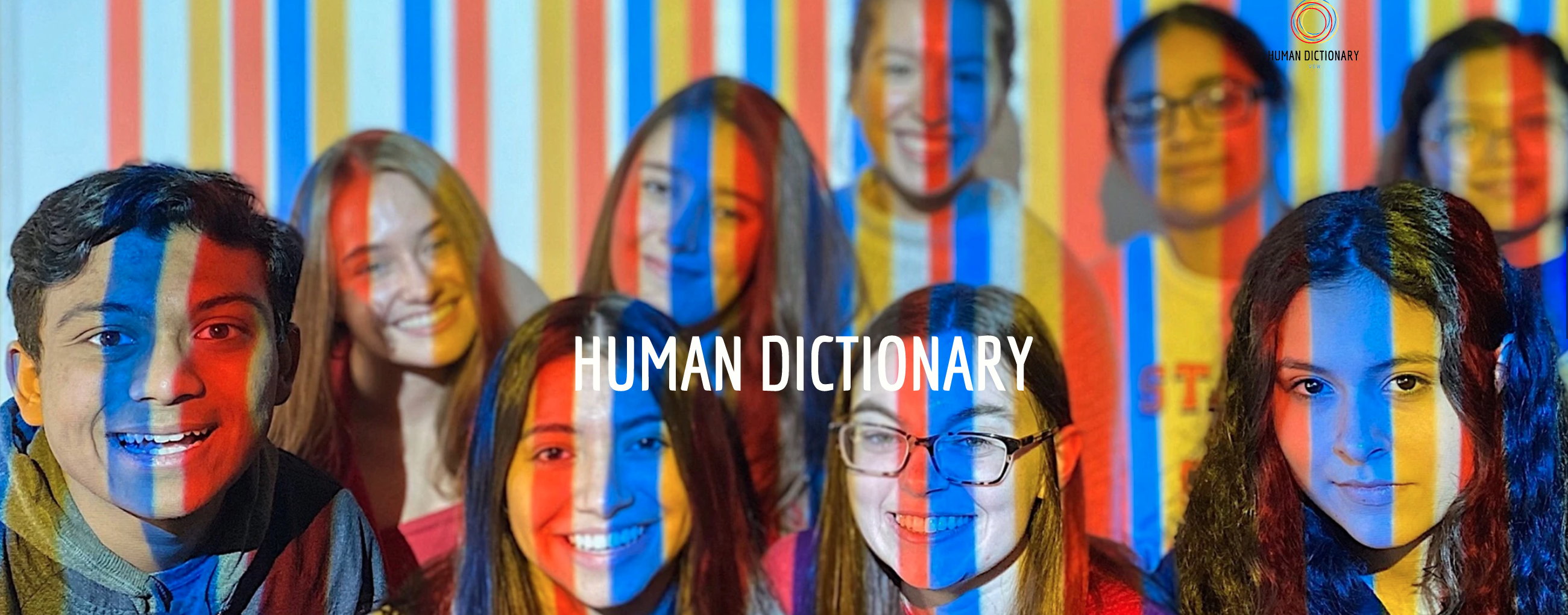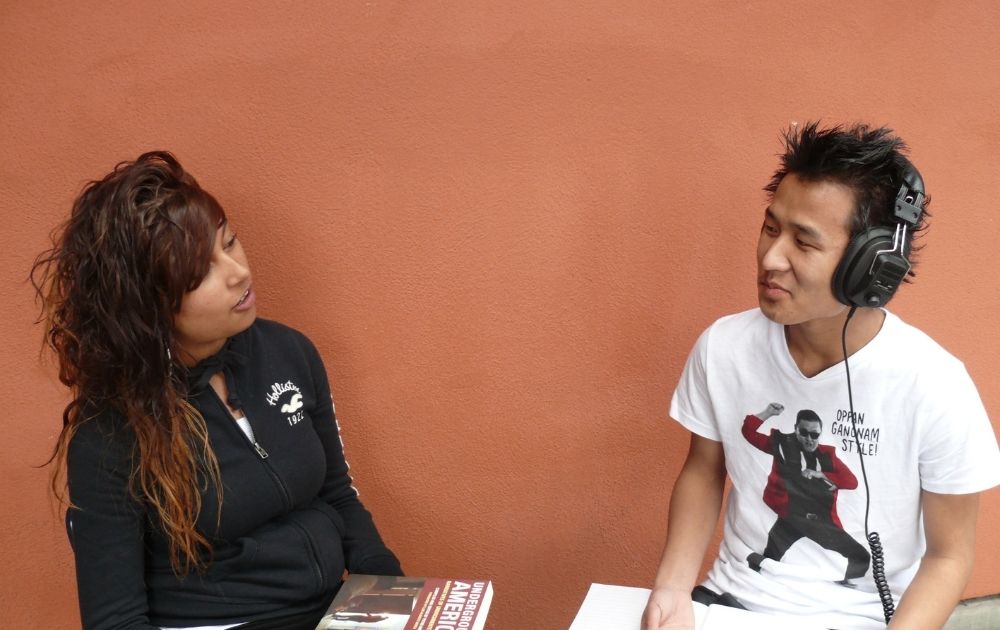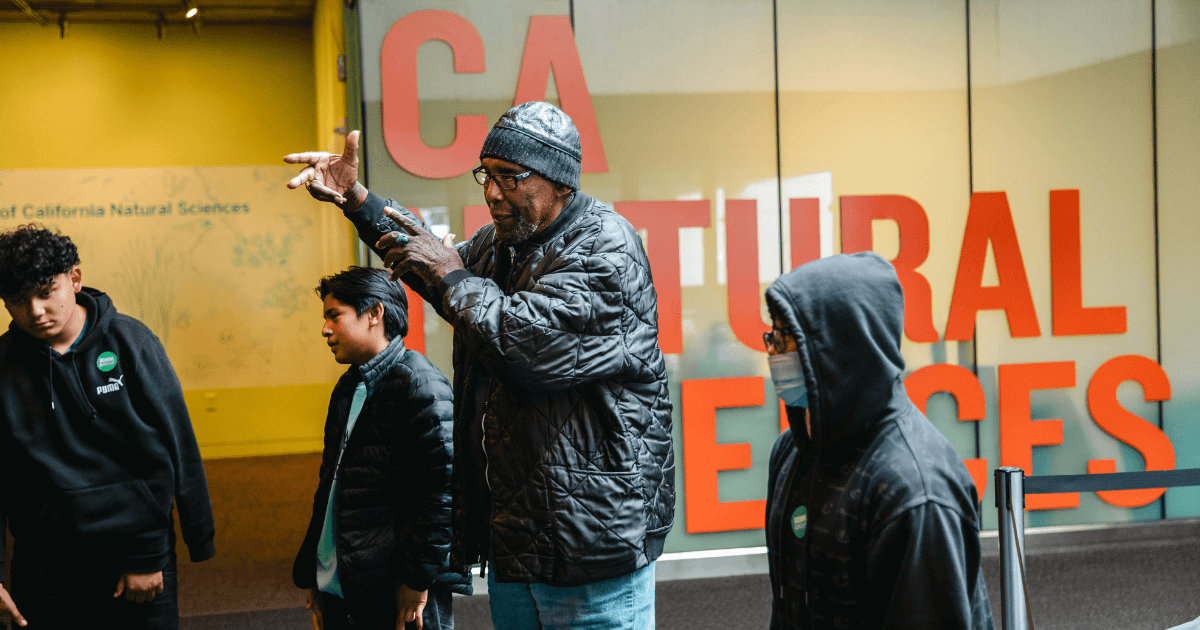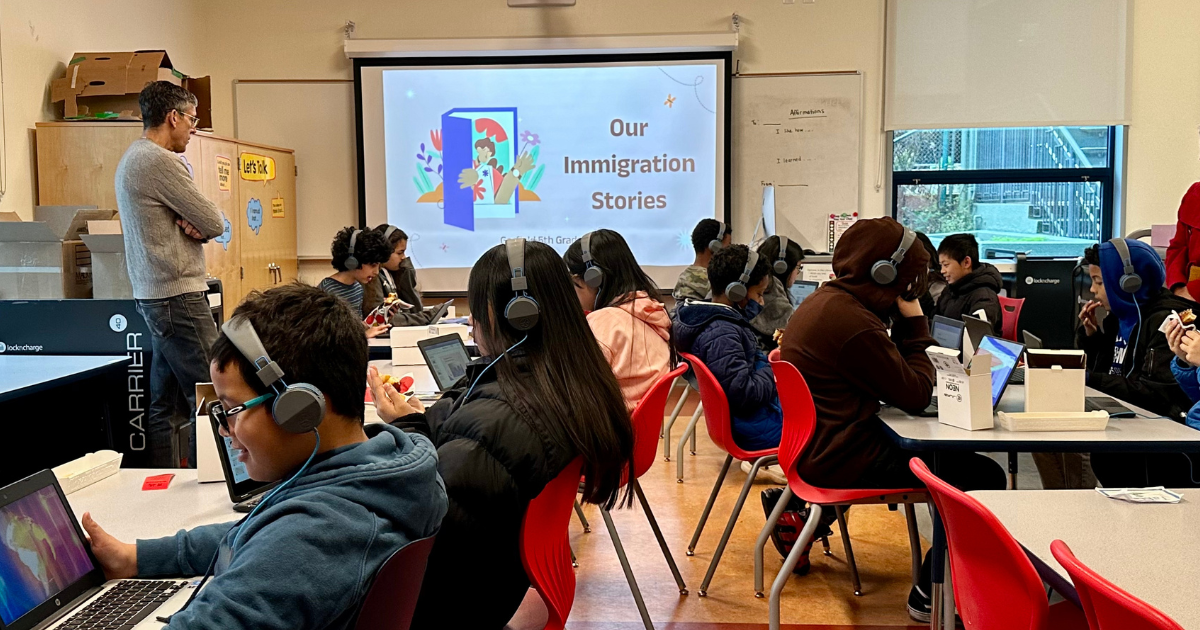
Stagg VOW is a year-long, high school level English course, offered at Amos Alonzo Stagg High School in Palos Hills, IL. Students in the Stagg VOW class use oral history to collect and share out stories from the community. Teachers Lisa Thyer and Chris Wendelin developed the course in collaboration with the VOW education team, and this is the fifth year it has been offered at Stagg High School.
Students study the craft of oral history with readings from the VOW book series and other key texts. Putting their oral history learning into practice, the students begin conducting their own interviews and honing their listening, transcription, and editing skills. This year, the course was cut short when COVID-19 put an end to in-person schooling. However, a small group of students decided to continue their oral history project, called Human Dictionary, in an effort to provide inspiration and solidarity during a difficult time.
Voice of Witness spoke with teachers Lisa Thyer and Chris Wendelin and three students—Arjun, Nicolette, and Suaad—about the Stagg VOW class and their Human Dictionary oral history project.
VOW: What do you see as the core components of the Stagg VOW course, and how has it evolved over the years?
Ms. Thyer: It has always been oral history based. We’ve gotten better at emphasizing the values and principles of oral history and finding a way to discuss different current events. That’s a big core component of the class: oral history itself, the process, looking at examples. In the second semester, once the students have practiced, we’re able to let the students do whatever they are interested in. They can pursue questions that they are passionate about. It becomes truly project-based.
Mr. Wendelin: The way it began, we had a very clear goal of what we wanted to do: use oral history to try and build empathy in our school community through creating a book. Then as we got away from that, we became more anchored into Voice of Witness as an organization and using the core principles of Voice of Witness as our teaching points. We don’t have any tests or multiple choice. We just try to lead the class by establishing these pillars of what good oral history is and why we do it. How can we use stories as a way to build empathy? We always go back to: “how does this complicated thinking?” or “how is this person more than their trauma?” It becomes our role as teachers to facilitate those discussions.
We started a small group project that the students got to design. Once school stopped, these students kept going with the Human Dictionary project and saw a new way to honor people’s stories in the middle of this quarantine.
VOW: Do you feel like there are principles or elements of a Voice of Witness oral history approach that really resonate with you as teachers or as students?
Mr. Wendelin: To “complicate thinking” is something we always come back to. We talked about the danger of a single story – and especially in high school, the land of single stories. We need to work extra hard to complicate thinking on not only the way people see themselves, but also looking at outside news stories around what’s going on in our community. In our discussions, a lot of good comes from those questions that help us think about what oral history can do why we’re doing it.
Arjun: I remember we watched the [Chimamanda Ngozi Adichie] TED talk about the single story. I like the idea of expanding beyond a single story because it’s something that’s really hard to do. The value of empathy and how you practice it is through oral history is a hard skill to master, like critical thinking. Also, the idea of interviewing as a way to expand empathy is interesting to me.
VOW: What do you feel like you’ve taken away from the course on the whole?
Nicolette: Personally, I think I gained a lot of empathy through it. I started seeing people in a really different way after the class. From all these skills that we learned for interviewing, now when I talk to people, I know how to create a safe space between us.
Suaad: I also learned how to ask the difficult questions or have the difficult conversations that no one really wants to have. One moment that really sticks out in my head is when we talked about the Rodney Reed case and all the problems with the criminal justice system. These systems that are in place are really terrible, but no one’s having the conversation so they’re never going to get fixed. I really want to talk about the difficult questions or conversations because these things need to change and they’re never going to change if we don’t.
Arjun: I totally agree. At the beginning of the year, we read an oral history [in VOW’s book, Six by Ten] from a man who the police framed for the murder of his parents. It was his story and his life, and the whole collection was voices of people who are in jail or incarcerated. It was really cool to read because it was a group of people we normally don’t hear from in society. It is really important to humanize them and give a full picture, beyond just a face or a name.
Also, just in general with people I cross in the hallway, I now have a better understanding that there is depth to everyone, even if I don’t know the person very well. This class has helped me realize everyone is their own person with their own stories and experiences of the world.
Ms. Thyer: We saw that, too. We took the students to StoryCorps at the Chicago cultural center. They have an interview booth there and we had arranged a field trip so that the students could go. We tried to pair them up with people they didn’t really know. Watching them come out [of the interview booths] and talk about it after, you could just feel the respect for each other’s stories.
VOW: Are there any ways you think this class has impacted you all as people?
Nicolette: I think I carry within myself all those skills and the empathy. I am really excited to go to college, meet new people, use all the skills that I learned here, and hear stories of new perspectives of life.
Suaad: In terms of getting to know other people, I started asking the questions that you ask in an [oral history] interview to get someone’s story, but in regular conversation. Now I’m really interested in getting to know other people’s whole stories. Those questions are always going to be in the back of my mind.
Arjun: I agree with that. Those questions have been great for building relationships. I will use the questions, the skills, and the values from here to strengthen or create relationships.
VOW: Tell us about the Human Dictionary project. How was the idea conceived and what were the motivations and goals for the project?
Nicolette: The project had so many turns. It started out concentrated on love, hope, anger, sadness. Then we decided to make it broader, with more emotions. We didn’t want to put limits to it.
Arjun: We wanted to hear what people’s experiences with emotion are. How do people define their own emotion? What are the most extreme expressions of emotion you’ve had? On a day-to-day basis, what emotion drives you? We wanted to focus on emotion because it’s something that makes us human. It’s the whole idea of humanizing people. That is why we called the project the Human Dictionary––because it’s about people’s ideas of what emotions are and [what they] represent.
VOW: When the pandemic started, how did that impact the project?
Nicolette: After they told us we weren’t coming back to school, our team had zoom meetings and decided we didn’t want to just leave the project. We had all these cool ideas and were so excited for the project. We decided to keep it going and do small interviews and feel the emotions that people are feeling right now, being stuck at home and during the [pandemic] situation.
Mr. Wendelin: We talked about acknowledging that we are living history. It gave us the idea to keep these projects going in a different way. Everyone feels very alone and is going through these experiences that no one’s talking about. It was a light bulb moment hearing from you, Arjun, how needed a group is right now––especially for seniors in high school who are dealing with being at home during this very important time when you want to be at school.
Arjun: This is history in the making, but without actually asking, we won’t get the individual perspectives of what’s going on with people. Thinking back to my history textbook, there’s probably going to be half a chapter on this time period and it’s going to be very basic, such as “this many people died, this is the economic impact.” The history textbook won’t tell you how people were feeling during that month. But it’s still part of history, which is why it’s so important.
I personally thought we were going to be able to come back to school. I didn’t really realize how big of a thing this was. We’re seniors and we’re not getting closure, so we wanted to hear those stories of how people are reacting and feeling about this. You won’t necessarily hear that on the news at night.
VOW: Who do you want the Human Dictionary project to reach or inspire? Who do you think this project could impact?
Suaad: At first it started off as wanting to make the seniors and our peers feel better. But as it progressed, we wanted to reach everybody. Everyone is suffering. Losing the last year of high school, people are losing their jobs, and some people actually have the virus. Some members in our group interviewed nurses and essential workers on the front lines. We wanted to reach them too because we want everyone to be in this together and read these inspiring stories and not feel alone.
Arjun: We also read stories about how the pandemic is impacting senior citizens. My next interview is my great aunt. The stories we read were about issues of ageism, and how seniors are pushed out as a group. We want to put them in the spotlight and hear their perspectives, their fears, and what they’ve experienced in terms of prejudices. That was another target group that we wanted to both interview and have as an audience.
VOW: What has it been like continuing this project remotely?
Nicolette: It has been quite challenging. Personally, the whole situation has hit me in an emotional way really hard. I am motivated about the whole project, but the situation brings me down and it has been challenging to work on it. We’re also missing that human connection of talking to people [in person]. When you’re on a video call, you don’t really feel whether that person is comfortable. You can’t see if that person is shaking. You can’t read their body language, you can only see their face or listen to their voice.
Arjun: It’s definitely harder when there’s literally a screen that separates you. It works, but it’s hard to really connect without seeing the person. If there are any audio challenges or someone’s connection cuts out, it’s harder to get what people say in the [interview] transcription. You don’t want to ruin their thoughts or mess up words or names, so that’s a challenge.
Suaad: One of the challenges for me personally was trying to juggle this with all my other schoolwork. I feel like we had a responsibility as people, not just for this class, to continue this project. It was our responsibility to keep this project going. It was really hard at first because it was making it all more real. I was kind of in denial about this whole [pandemic], but then I found some motivation to keep going.
Mr. Wendelin: Oral history is a really amazing thing as a teacher to see students engage in. Ms. Thyer and I give these students an incredible amount of responsibility, and we can’t say enough about them. They don’t have an answer key, they don’t have a safety net, it’s just them talking as a human to another human being about something that could be life changing. Since school has been online, we’re just facilitators––more like teammates now. In this situation, the students are out there totally independently. So much credit goes out to them for handling these issues well and being willing to try. I can’t speak highly enough about a group that could very easily just stop doing school, but continued on because they felt that, like Suaad said, they had a responsibility to hear these stories.
Ms. Thyer: The students were great about talking through their ideas. We had some zooms, but it’s not quite the same as seeing them every day and making sure they’re doing okay. [The pandemic] took that part away from class. Like Mr. Wendelin said, there’s not enough gratitude or praise we can give this group. In so many ways, it was much harder for them to keep going in these circumstances, but they felt this responsibility and they care about this. They epitomize some of the principles that we talked about.
VOW: That commitment and responsibility is so clear. Is there anything else that you want to share?
Mr. Wendelin: We’ve become really tied to Voice of Witness in terms of people over the years, as well as content: Say It Forward, the VOW Reader, Power of the Story, and Surviving Justice. We’re really fortunate to be able to run a class like ours, and we feel amazingly blessed to have Voice of Witness as an organization supporting us. And to have students that get excited about talking about empathy. In conversations, we start to hear the links between our students at Stagg and the Voice of Witness mentality and values, and it is something we feel incredibly grateful for.
Check out the students’ Human Dictionary oral history project.
Learn more about the Stagg VOW course (and access a toolkit for educators who want to replicate the course model).
Sign up for VOW’s education newsletter.




